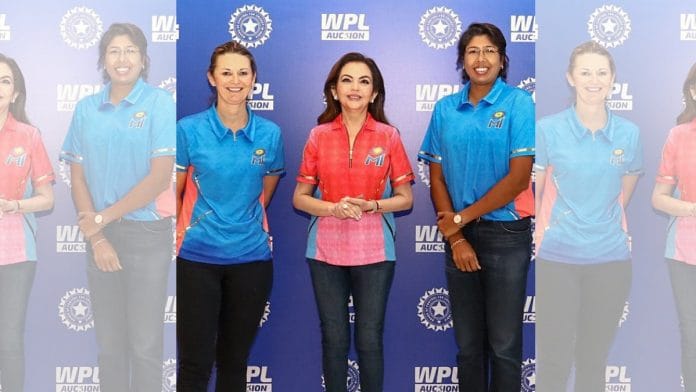New Delhi: After several years of exhibition matches played under the ‘Women’s T20 Challenge’, the long-awaited inaugural auction of the Women’s Premier League (WPL) — India’s T20 cricket counterpart for women cricketers to the men’s IPL — took place in Mumbai this Monday.
Of the 449 cricketers shortlisted who went under the hammer in the auction conducted by Mallika Sagar, 87 were bought by the five WPL franchises, including 30 foreign players. The franchises were permitted to select between 15 and 18 players, of which a maximum of six players could be from outside India, including from associate cricketing nations.
Each team was allowed an auction purse of Rs 12 crore to fill up their squad with, which is significantly lower than what the men’s IPL franchises are afforded, thereby requiring WPL think tanks to plan accordingly. However, astronomical purchases dominated the early part of the auction as Smriti Mandhana received the highest bid at Rs 3.4 crore from the Royal Challengers Bangalore.
With the first match slated for 4 March, ThePrint takes a look at how the teams of this inaugural WPL season stack up.
Also read: As Odisha gears up for hockey World Cup, here’s how new rules have made the game much faster
Royal Challengers Bangalore
The Mike Hesson-led think tank at RCB made the first big money splashes at the auction by engaging in bidding wars with Mumbai and Delhi for Smriti Mandhana and Harmanpreet Kaur, snapping up the former. They followed up with the relatively economical buys of New Zealand captain Sophie Devine, Australia’s Ellyse Perry as well as India stars Renuka Singh Thakur and Richa Ghosh. However, with most of their budget gone long before the accelerated rounds, they needed to complement their flashy buys with a series of punts on youngsters and fringe players. While the aforementioned senior players sort out most of RCB’s batting, particularly the finisher role, and a significant chunk of their bowling loads, they may also be forced to carry numerous inexperienced members playing at the highest level for the first time.
Potential starting XI: Smriti Mandhana, Sophie Devine/Dane van Niekerk, Heather Knight, Ellyse Perry, Richa Ghosh, Kanika Ahuja, Shreyanka Patil, Preeti Bose, Megan Schutt, Renuka Singh Thakur, Komal Zanzad.
Mumbai Indians
The five-time champions of the men’s edition were the other big story of the early phase of the auction when it came to targeting the top players. As such, over the course of the proceedings, it was either big money or bargain basement deals for Mumbai, nothing in between. They brought in Harmanpreet Kaur early and broke the bank for England star Nat Sciver-Brunt, while also underspending on the likes of New Zealand and West Indies all rounders Amelia Kerr and Hayley Matthews, as well as South Africa power hitter Chloe Tryon. However, the extent to which they were willing to forego significant chunks of a meagre purse for their top choices meant that the overall strategy still appeared scattergun, of sorts.
Potential starting XI: Yastika Bhatia, Hayley Matthews, Harmanpreet Kaur, Nat Sciver-Brunt, Chloe Tryon, Amelia Kerr, Priyanka Bala, Amanjot Kaur, Pooja Vastrakar, Jintimani Kalita, Saika Ishaque/Neelam Bisht.
Gujarat Giants
Newcomers to the Indian franchise cricket world, the Adani-owned Gujarat Giants employed their own lopsided strategy of going hard for overseas stars early on, particularly the Australians. While they landed all rounder Ashleigh Gardner and batter Beth Mooney relatively early, they had used up 5 of their 6 designated overseas slots within the first few rounds and had a brief moment of embarrassing miscalculations during the accelerated phase when trying to go for UAE player Mahika Gaur. As a result, for a side boasting foreign firepower, they lack in proven reliable Indian talent, with Sneh Rana and Harleen Deol as their senior-most India selections.
Potential starting XI: Beth Mooney, Sophia Dunkley, Harleen Deol, Deandra Dottin, S Meghana, Sushma Verma, Ashwani Kumari, Georgia Wareham, Sneh Rana, Tanuja Kanwer, Mansi Joshi.
UP Warriorz
They weren’t the most eye-catching in their selections nor will they attract the most amount of fanbase hype going into the tournament, but the Capri Group-owned UP Warriorz had a well-balanced auction and assembled a far more well-rounded team on paper than most of their competitors. Built around their marquee signing of local hero Deepti Sharma and an overseas core, the Warriorz were the first to hit the 15-player minimum threshold and arguably secured the two biggest steals of the auction — Australia wicketkeeper Alyssa Healy for Rs 70 lakh and England left arm spinner Sophie Ecclestone for Rs 1.8 crore.
Potential starting XI: Alyssa Healy, Shweta Sehrawat, Tahlia McGrath, Kiran Navgire, Simran Shaikh, Devika Vaidya, Sophie Ecclestone, Parshavi Chopra, Shabnim Ismail, Anjali Sarvani, Rajeshwari Gayakwad.
Delhi Capitals
A joint venture between JSW and GMR since 2018, the Delhi Capitals were by far the slowest off the block, not landing a single player until the third set. But when they did get involved, they frontloaded their purchases by settling on a top order and finalised a trio of all-rounders. Shrewdly in light of their competitors blowing their budgets earlier, they capitalised on the accelerated rounds to target value buys. They were also the only side to target an associate player in American pace bowler Tara Norris, who has plied her trade in England with The Hundred. As a result, Parth Jindal and his Cricviz-influenced think tank have assembled a side that, much like their male counterparts, appear to have all bases covered without needing to break the bank often.
Potential starting XI: Shafali Verma, Jemimah Rodrigues, Meg Lanning, Marizane Kapp, Alice Capsey/Laura Harris, Taniya Bhatia, Jess Jonassen, Shikha Pandey, Tara Norris, Arundhati Reddy, Poonam Yadav.
(Edited by Smriti Sinha)
Also read: From Eden Gardens to Gol Maal — how Pelè made his way into India’s popular memory






